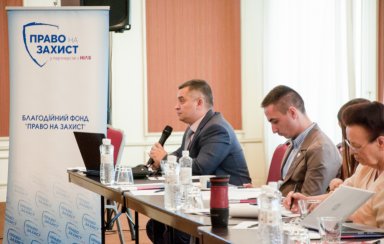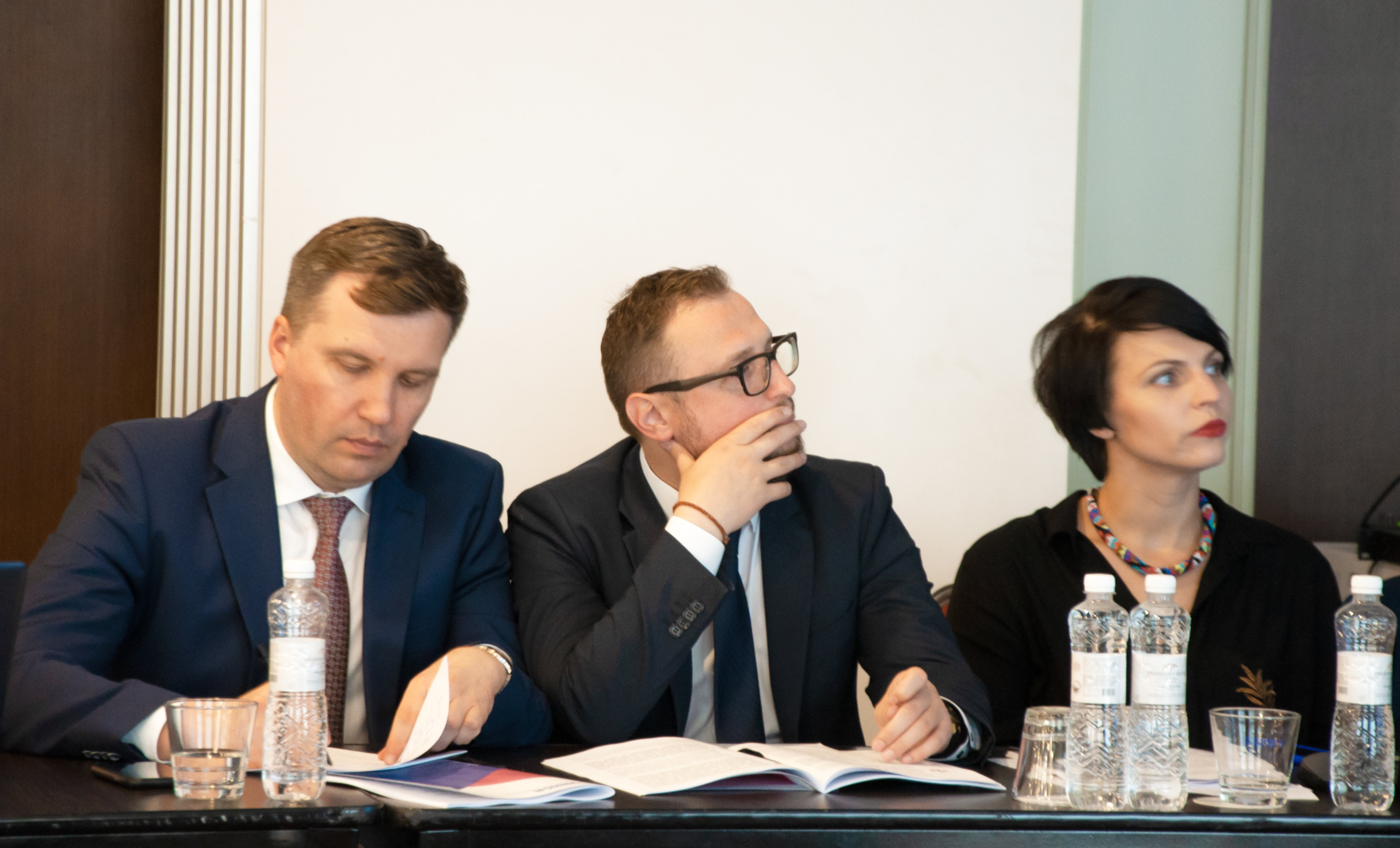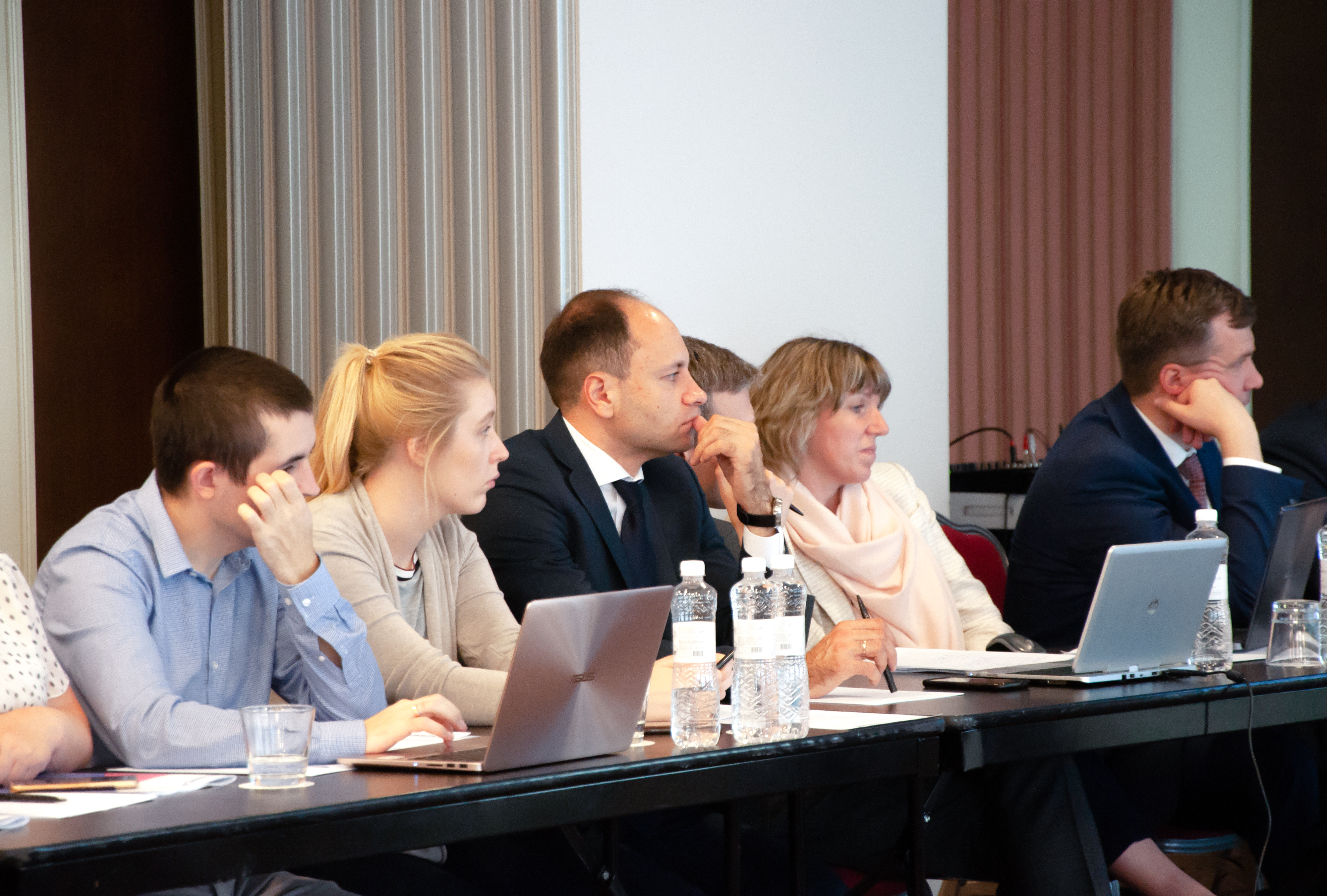Contact center of the Ukrainian Judiciary 044 207-35-46

About 50 thousand houses across the inter-entity boundary line were damaged or ruined because of military operation at the East of Ukraine. Due to imperfect legislation, there are no effective mechanisms of compensation of citizen’s losses by the state. This topic was discussed while the presentation of analytical study of case law in Ukraine regarding the compensation for damaged/ruined property due to armed conflict. The event was held by the Charitable Foundation "The Right to Protection" with the support of the UN Agency for Refugees’ Rights in Ukraine.
Yevhenii Petrov, Judge of the Civil Cassation Court within the Supreme Court, presented his speech. Judge of the SC Grand Chamber Vitalii Urkevych, the Head of the SC Department for Analytical and Legal Work Rasim Babanly and the Head of Legal Sub-Department (IV) within this very Department Mykhailo Shumylo participated in the presentation.
Doctor of Juridical Sciences Yevhenii Petrov before the victory in May this year in the competition for the position of the SC judge worked as a judge of Druzhkivka city court of Donetsk oblast. Thus, he has experience of reviewing cases, which have become the subject of study, in the first instance. Besides, the judge actively participated in a working group established by judges from the first and appeal instances of Donetsk and Luhansk oblasts. Participants of this group discussed urgent issues rising before court while considering the noted category of cases. He also was one of initiators of the judicial forum devoted to this topic.

The reporter told about basic issues judges face with, and the way they deal with these issues. Primarily, the judge noted that at a session of the working group its participants agreed on the impossibility to refuse to open proceedings because of the lack of law or another normative-legal act regulating the compensation of damages for damaged/ruined property, or because of the lack of a public authority obliged to perform such compensation. The judge said that they had clarified this issue, and presently they did not face the refusals on those grounds.
They also have elaborated a position, pursuant to which it was impossible to refuse to open proceedings due to lack of evidentiary support of damaging by actions of defendants noted in a claim, particularly by the Security Service of Ukraine or the State Emergency Service of Ukraine, etc. Opponents of such a position believed that it was necessary to prove the guilt of such defendants.
Many questions arose as to which public authorities should be involved into the case. Yevhenii Petrov noted that in 2015-2016, except for the Cabinet of Ministers of Ukraine the President of Ukraine, as well as the Verkhovna Rada of Ukraine, the SSU and the SESU had been determined as co-respondents. But subsequently, the case law determined that it was sufficient, when an individual involved the Cabinet of Ministers of Ukraine as the principal defendant.
According to the speaker, it is a very controversial issue, whether the aggressor – the Russian Federation – should be involved into the case. He told that, last year while considering a case at the first instance at the request of the plaintiff's lawyer, he had involved the Russian Federation into the case and had sent all the necessary materials for familiarization to the Ministry of Justice of the Russian Federation, but there had been no feedback. The reporter remarked that the lawyer had constantly made inquiries about the movement of the case, had promised to complain on him; he had replied that he had not been able to influence on receiving response from Russian government, but it had been involved into the case just under the motion of the lawyer.
Yevhenii Petrov has also drawn the presents’ attention to a case, when the Cabinet of Ministers of Ukraine had submitted a motion on the involvement of the Russian Federation as the third person without distinct requirements. The court asked, the position of which party the third person should support. Both plaintiff and defendant were opposed. The court refused to satisfy the request because the defendant's representative had been given time to determine whose party the Russian Federation should support, but he had not yet decided. Yevhenii Petrov noted that some appellate judges had disagreed with this position, considering that in such cases the court should, on its own initiative, determine the Russian Federation as the third party to support the defendant. But what if the defendant's representative was against it?

Issues also arose as to the volume of damages caused. In particular, the defendant's representatives have always made a request for the reduction of such amount according to the sum of the assistance provided by charitable organizations. The judge said that he had not agreed with that and had justified his position.
According to him, the issue of unconditional transfer of proprietary right to dwelling to the community in case of receiving compensation is very controversial. Yevhenii Petrov told that a particular community, represented by the Yasinovata District Civil-Military Administration, had refused to accept the dwelling, and had explained that it had not been able to accept it, and had asked the court to explain the appropriate procedural mechanism. It had requested, which agreement should be concluded: on gift, exchange, etc.
Summarizing the report, Yevhenii Petrov emphasized that he had always supported the position that damage should be compensated, when sufficient volume of materials about property damage was collected.
After that the judge provided answers to questions of the event participants. Particularly, representative of the National School of Judges of Ukraine, retired judge of the High Specialized Court of Ukraine for Civil and Criminal Cases Halyna Yurovska noted that there were judgments on the establishment of a fact of causing damage because of armed aggression of the Russian Federation. The representative of the HSCU asked, whether these judgments could be the reason for refusal to compensate damage, since due to the adoption of such a judgment as for the plaintiff, the Russian Federation should be the defendant. The issue aroused discussion among the event participants. Yevhenii Petrov agreed that, primarily, the damage should be compensated by Ukraine, and later the state should find the mechanism for charging these funds from the aggressor state.